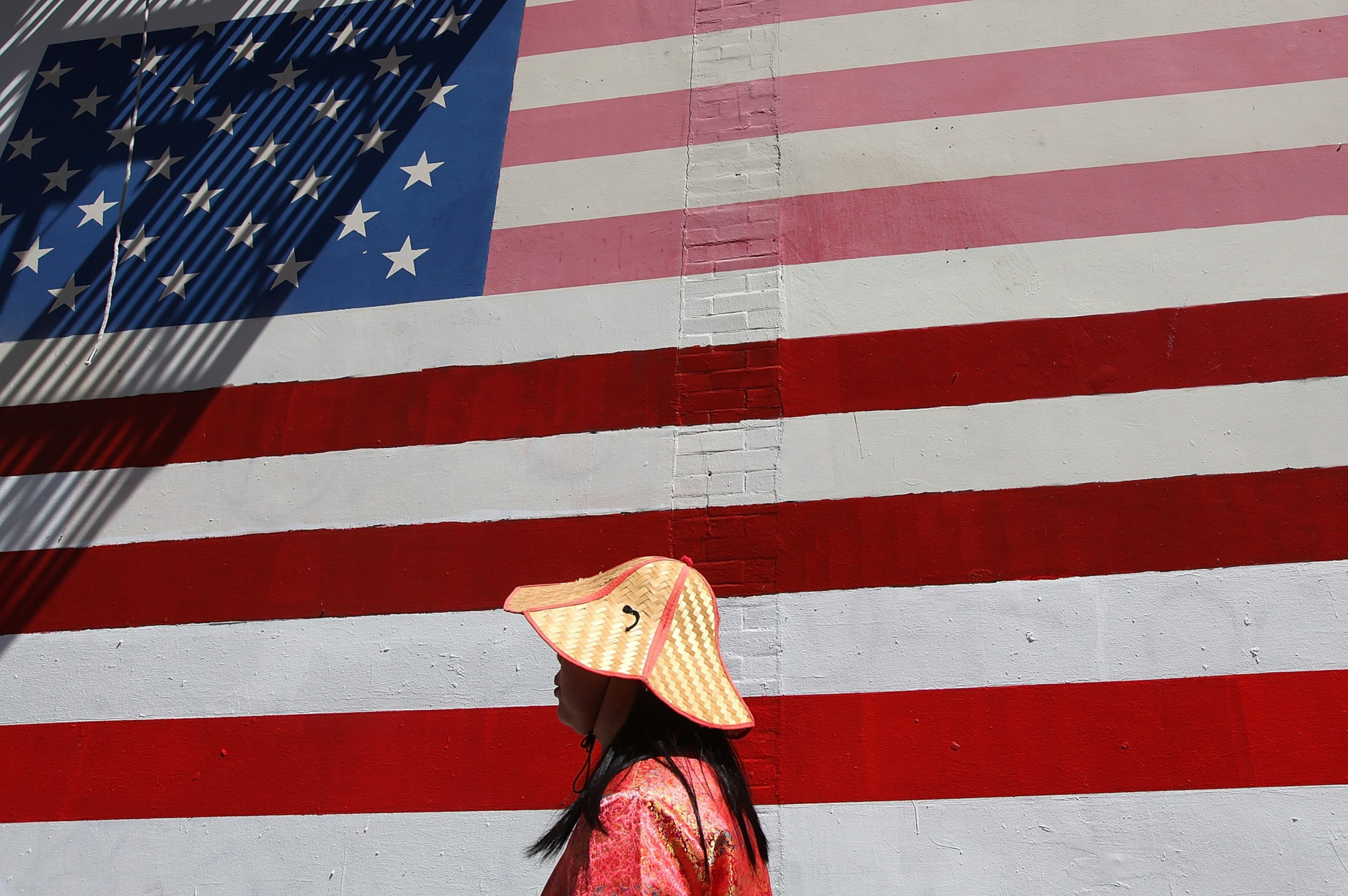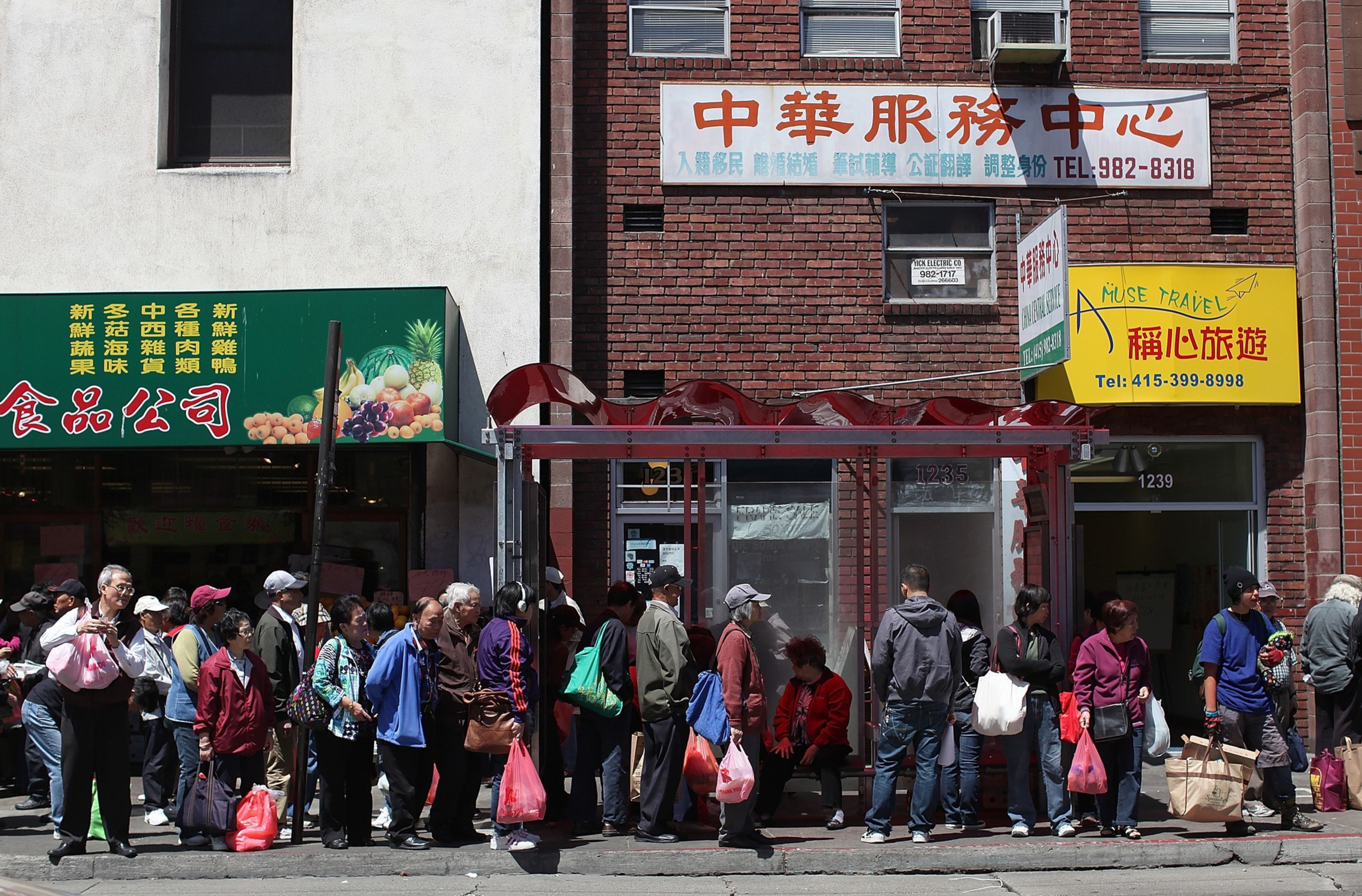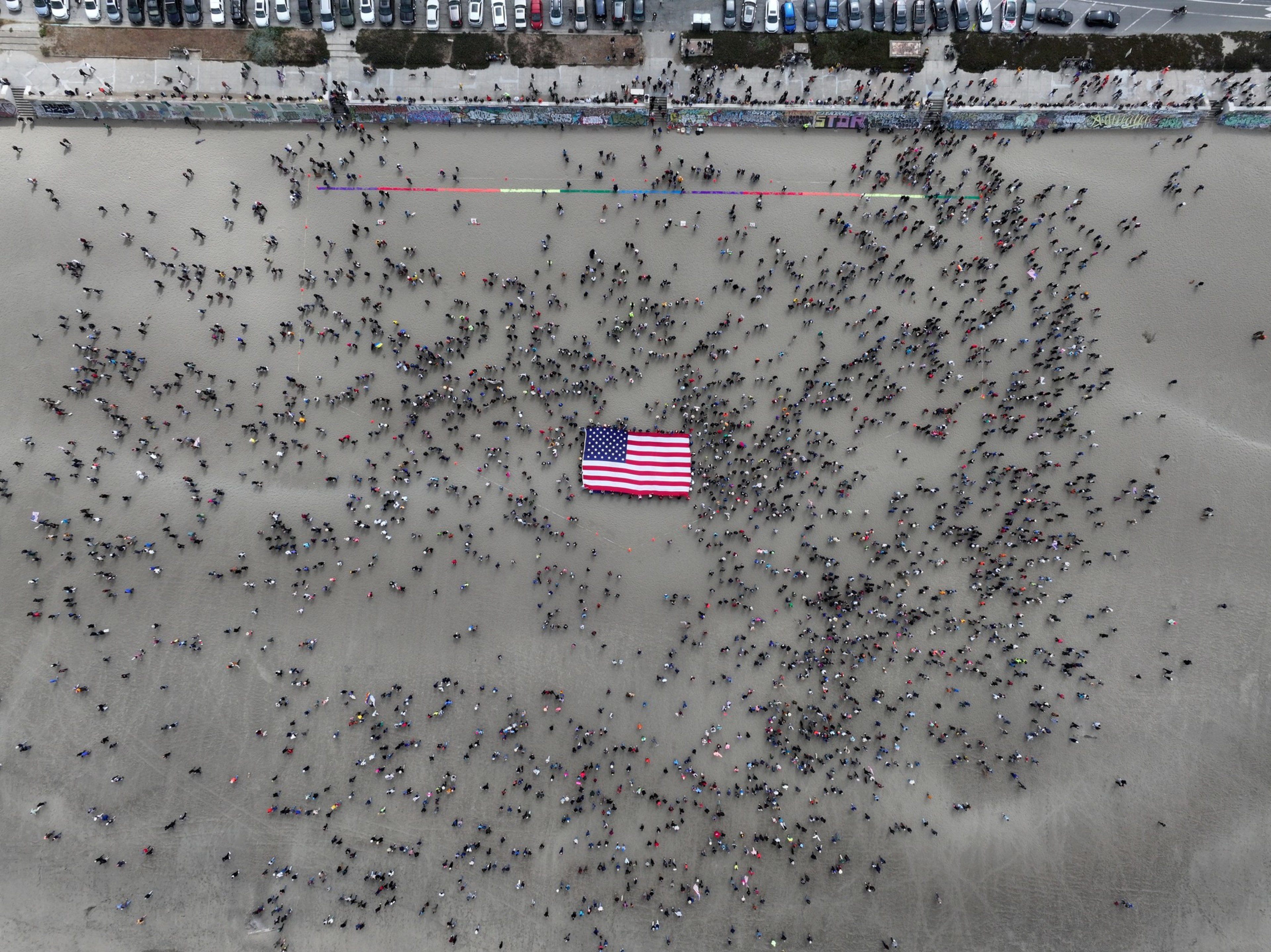The hair salon on Mission Street is dark, the front door is locked, and the chairs are empty — but the business isn’t closed. Inside, a stylist shampoos a client at a station behind a wall of products for sale, hidden from the view of any unwelcome person who may be peering in from the street.
“We’re just keeping the door closed because of immigration,” the stylist explains in Spanish, furtively checking for anyone who may be lurking outside. Then he returns to his client, both of them hiding as they go about the suddenly dangerous business of a haircut.
San Francisco immigrant communities are collectively ducking in anticipation of a punch. Many migrants are retreating from public life and work, and businesses that cater to them are suffering. The U-Haul parking lot in the Bayview is bereft of the normal crowd of day laborers. A community sports league renounced its permit with the Recreation and Parks Department. The league is “sitting out this season due to some of their players feeling nervous about immigration risks,” according to a spokesperson for the department.
Nevertheless, as the specter of Immigration and Customs Enforcement raids looms over California, San Francisco so far has been spared the worst. While ICE is regularly arresting immigrants at their scheduled administrative check-ins and outside the courthouse, before they get a chance to plead their cases before a judge, the city has not weathered workplace raids or cavalries in its parks.
To some, this might look like the calm before the storm. But for the estimated 43,000 undocumented people living in San Francisco, the businesses and community groups who serve them, and the companies that employ them, it is more like the anxious scramble before the storm — a rush to bar the doors, board up the windows, and get the hell out of town if you can.
‘They’re escaping. They’re returning to Mexico.’
Tania opened the Mission Street hair salon in 2016, when she herself was undocumented. Today the 55-year-old Mexican immigrant has legal work authorization, but she declines to share her last name, afraid that somehow she might end up detained by ICE.
In its early days, the shop regularly spilled over with patrons waiting half an hour for $20 fades. Just six months ago, the salon employed seven hairstylists. Now Tania’s staff is down to just herself and one other stylist.
'I’ve been in the U.S. 31 years, longer than I lived in Mexico,' Tania says, crying. My whole life is here, my kids, everything. Just imagine that, leaving all that we’ve accomplished behind.'
An hour before closing, the salon would usually be bustling, but today it’s empty.
Tania sits, looking tired. She describes her daily life succinctly: “Surviving.” Business is down 70% since the ICE raids began in Los Angeles in June, she says. Her clientele is mainly undocumented people, and “people are scared to go out and spend.”
Tania points out the front windows at an unnervingly quiet block of Mission Street. “A few months back, this was all busy,” she says. “Now look at my neighbor.” A taqueria a few storefronts down has set up a taco station on the sidewalk to attract customers.
Tania guesses her clients are hiding, mostly at home. But some, she’s sure, are leaving the country. “I’ve been speaking to some of my clients from Mexico,” she says. “They’re escaping. They’re returning to Mexico.”

Tania has no plans to leave, but her survival in San Francisco feels tenuous. She’d been carrying her most important documents — driver’s license, Social Security card, and authorization to legally work in the U.S., which her son helped her attain last year — everywhere out of fear.
Last month, a client stole her purse from the shop. Now her documents are gone.
When she thinks of what she lost, her chest clenches. She has high blood pressure but doesn’t want to use her Medi-Cal coverage; she worries it will affect her efforts to attain permanent residency. “Trump says he doesn’t want us to use public services,” she explains.
If business doesn’t improve, she will close her salon when the lease expires in 2026. In the meantime, without her papers, she worries about being detained and deported. “I’ve been in the U.S. 31 years, longer than I lived in Mexico,” Tania says, crying. “My whole life is here, my kids, everything. Just imagine that, leaving all that we’ve accomplished behind.”
Tania advises her clients to have faith. She regularly prays that God will touch President Donald Trump’s heart. “The law can’t constrain him; he just does what he wants. So I think that God is the only one who can stop him.”
‘Every day, less business’
At a mini market on the edge of Chinatown, Kevin, 29, a babyfaced cashier and Chinese immigrant, worries about his job.
Weekends used to be bustling. Now employees regularly outnumber customers. The market’s clientele is mostly Chinese immigrants. Kevin blames their absence on the fear of immigration enforcement. “ICE problem is big problem,” he explains.
The Migration Policy Institute in 2019 estimated that San Francisco was home to 10,000 undocumented immigrants from China, the most of any country. But for those who wish to help them, they can be difficult to find these days.


Presbyterian Church in Chinatown, a 170-year-old institution that has long supported undocumented San Franciscans, does not have any Chinese immigrants’ cases to work on. Right now, the church’s immigration group is concentrating its efforts on undocumented Latin Americans. Community and faith leaders in Chinatown say undocumented Chinese immigrants are more isolated than those of other nationalities. One explains that Chinese undocumented people often arrive in the U.S. alone, without family or friends waiting for them. And the fresh fears of ICE action have driven them into hiding.
On the busiest stretch of Stockton Street, a few blocks away, tourists and shoppers at the markets overflow into the street, squeezing between parked cars. Store managers say fear of ICE hasn’t affected their business.
“That’s totally bullshit,” says Kevin. He’s certain the stores on Stockton are hurting, even if weekend crowds mask the problem. But where Kevin works, with its locals-only clientele and thin margins, the drop in foot traffic hits harder.
For the estimated 43,000 undocumented people living in San Francisco, it is more like the anxious scramble before the storm — a rush to bar the doors, board up the windows, and get the hell out of town if you can.
Kevin says his market employed 10 full-time workers and two part-timers as recently as six months ago. The staff has since contracted to eight full-time and no part-time.
If a bit of chaos and even scarcity of goods is the sign of a healthy grocery store, the neatly organized and occasionally overflowing shelves at the market indicate a business in peril.
Six months ago, by mid-afternoon on a weekend, the store would have sold 12 butchered pigs. On this day, it has sold seven. Usually there would be no more lobster. Instead, there are half a tank’s worth atop the seafood counter well past 3 p.m. “Look at the apples outside,” Kevin says, pointing to the front of the store, where cardboard boxes overflow. The store is throwing away more fruit than it has in the five years since he started working here.
A year ago at this time, he would have been ringing up customers until the early evening. But on this day, the employees begin cleaning up mid-afternoon. “Every day, less business,” Kevin says with a sad grin.

‘We don’t want to risk it’
Ramon and Susana’s barbecue in McLaren Park has all the trappings of a midsummer family cookout. But this one is a going-away party for a married couple self-deporting back to El Salvador.
Dressed in a 49ers baseball cap and a Warriors jersey as he works the grill, Ramon, 35, concentrates, his tongs deftly flipping pieces of arrachera. A can of Spam and box of Ritz crackers sit amid the tortillas, guacamole, and other taco ingredients on the stone picnic table — he and Susana needed to clear out their kitchen cabinets and have brought everything with them.
Like many Central American migrants, Ramon traveled through Mexico to arrive at the U.S. border. In 2022, he and 13 other people crossed the Rio Grande in an inflatable raft intended for six. The group made their way to a safe house in Texas, and Ramon eventually landed in a rented room in a shared house in Westlake, in San Francisco.
When Susana arrived a year later, they moved into an apartment in the Mission. The couple left their toddler son with Ramon’s parents in El Salvador. They planned to return once they’d saved $100,000 — money they would bring back to invest in a new business in El Salvador.
For three years, Ramon has worked for a flooring company. Only one person in his crew of 10 has legal work status. Susana found a well-paying job as a nanny. When her employer asked her to move with them to Texas, promising to employ her husband too, Susana and Ramon accepted. The move was planned for the beginning of 2025. Then Trump was reelected.
Ramon and Susana planned to wait things out, hoping the immigration raids would fizzle out. 'But things just got more intense,' Ramon says. 'So we decided, no, let’s get out of here.'
“When the president won, and Texas being so close to the border, we thought, ‘No, we don’t want to risk it,’” Susana says in Spanish. She quit and began nannying for another family.
“We wanted to stay” in San Francisco, Ramon says, “where people support undocumented people.”
That changed when the Trump administration began immigration raids in California. Even the Bay didn’t feel safe anymore. When Ramon lost cell service one day while on a job in Santa Cruz, his friends and family panicked.
“They were all worried, thinking that maybe ICE had arrested me.”
Ramon and Susana planned to wait things out, hoping the immigration raids would fizzle out. “But things just got more intense,” Ramon says. “So we decided, no, let’s get out of here.”
The Trump administration has promoted self-deportation as a centerpiece of its national mass deportation campaign. In May, Trump announced that the federal government would offer $1,000 and a plane flight back to the country of origin for undocumented people willing to leave the U.S. As part of the announcement, he floated the possibility that self-deportees might have an easier time reentering the U.S. one day.
U.S. Customs and Border Protection has chartered at least one flight, with 64 voluntary self-deportees. Ramon and Susana don’t qualify for the program, since it’s offered only to undocumented people who encountered Border Patrol officers while entering the U.S. They’ll be paying their own way to El Salvador.
They’re balancing a long to-do list with a desire to enjoy their last few days in California. They have to paint their apartment of two years, hoping to get their security deposit back, and move out their furniture. Then there’s a camping trip planned for Lake Tahoe. But before they leave, Ramon will have to collect $3,000 his boss owes him.
Ramon’s voice softens as he talks about leaving the life they built in San Francisco. Especially hard will be leaving his 1-year-old niece Lilian. In between prepping tacos, he plays a tender game of catch with her on the grass. “My wife and I were there at the hospital when she was born,” he says. “Sure, the life here is nice, but more than anything, it’s the people.”
But the couple are also happy to return to their son, who’s now 6.
“Every morning when we call him, he says, ‘You’ll be here in 15 days,’” says Susana. “The next day he says, ‘You’ll be here in 14 days.’” Ramon and Susana will return just in time for his birthday. But they’re coming back with $40,000 less than they’d planned.
Ramon’s sister Carolina, a legal resident, and her husband, Keith, a U.S. citizen, are also thinking of leaving. They’re considering El Salvador or Canada, where Keith holds dual citizenship.
“Everything’s on the table,” Keith says as he slices a final piece of meat to pass around. “We’ll see how things go with this possible future dictatorship in this country.”
For now, they’re still planning to put down more roots here. They have to leave the barbecue early — Carolina needs to study for her U.S. citizenship test.
Susana and Ramon are also thinking of the future of the U.S., even if they won’t be here.
“If Trump wasn’t president,” Ramon says, “we’d stay another year or two.” The extra time would allow them to reach their financial goal to improve their life in El Salvador.
“I hope we can come back,” Susana says. “Right now, I think things are just going to get worse.”

